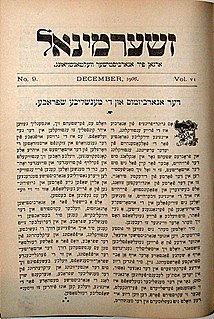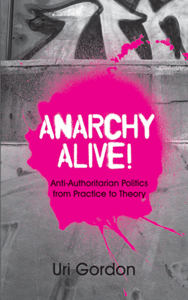Libertarian socialism, also referred to as anarcho-socialism, anarchist socialism, free socialism, stateless socialism, socialist anarchism and socialist libertarianism, is a left-wing, anti-authoritarian, anti-statist and libertarian political philosophy within the socialist movement which rejects the state's control of the economy under state socialism. Overlapping with anarchism and libertarianism, libertarian socialists criticize wage slavery relationships within the workplace, emphasizing workers' self-management and decentralized structures of political organization. As a broad socialist tradition and movement, libertarian socialism includes anarchist, Marxist, and anarchist- or Marxist-inspired thought as well as other left-libertarian tendencies. Anarchism and libertarian Marxism are the main currents of libertarian socialism.
Anarcho-syndicalism is a political philosophy and anarchist school of thought that views revolutionary industrial unionism or syndicalism as a method for workers in capitalist society to gain control of an economy and thus control influence in broader society. The end goal of syndicalism is to abolish the wage system, regarding it as wage slavery. Anarcho-syndicalist theory generally focuses on the labour movement. Reflecting the anarchist philosophy from which it draws its primary inspiration, anarcho-syndicalism is centered on the idea that power corrupts and that any hierarchy that cannot be ethically justified must be dismantled.
Anarchists have traditionally been skeptical of or vehemently opposed to organized religion. Nevertheless, some anarchists have provided religious interpretations and approaches to anarchism, including the idea that glorification of the state is a form of sinful idolatry.

Vsevolod Mikhailovich Eikhenbaum, known later as Volin or Voline (Во́лин), was a Russian anarchist who participated in the Russian and Ukrainian Revolutions before being forced into exile by the Bolshevik Party. He was a proponent of the anarchist organizational form known as synthesis anarchism.
National-anarchism is a right-wing nationalist ideology which advocates racial separatism, racial nationalism, ethnic nationalism, and racial purity. National-anarchists claim to syncretize neotribal ethnic nationalism with philosophical anarchism, mainly in their support for a stateless society, while rejecting anarchist social philosophy. The main ideological innovation of national-anarchism is its anti-state palingenetic ultranationalism. National-anarchists advocate homogeneous communities in place of the nation state. National-anarchists claim that those of different ethnic or racial groups would be free to develop separately in their own tribal communes while striving to be politically horizontal, economically non-capitalist, ecologically sustainable, and socially and culturally traditional.
Anarchism and nationalism both emerged in Europe following the French Revolution of 1789 and have a long and durable relationship going back at least to Mikhail Bakunin and his involvement with the pan-Slavic movement prior to his conversion to anarchism. There has been a long history of anarchist involvement with nationalism all over the world as well as with internationalism.
Jewish anarchism encompasses various expressions of anarchism within the Jewish community.
Anarchism is generally defined as the political philosophy which holds the state to be undesirable, unnecessary and harmful as well as opposing authority and hierarchical organization in the conduct of human relations. Proponents of anarchism, known as anarchists, advocate stateless societies based on non-hierarchical voluntary associations. While anarchism holds the state to be undesirable, unnecessary and harmful, opposition to the state is not its central or sole definition. Anarchism can entail opposing authority or hierarchy in the conduct of all human relations.
Anarchism has been an undercurrent in the politics of Palestine and Israel for over a century. The anarchist ideology arrived in Palestine at the beginning of the 20th century, carried by a big wave of emigrants from Eastern Europe. The ideas of Peter Kropotkin and Leo Tolstoy had remarkable influence on famous exponents of some Left Zionists. Anarchists organized themselves across Israel and Palestine, and influenced the worker movement in Israel. Anarchists often call for a zero state solution, to the Palestinian Israeli conflict, in reference to a complete abolition of the states of Israel and Palestine.

Pioneers of American Freedom: Origin of Liberal and Radical Thought in America is a book by the German anarcho-syndicalist Rudolf Rocker about the history of liberal, libertarian, and anarchist thought in the United States.

Germinal was a Yiddish-language anarchist journal in London edited by the German-born Rudolf Rocker. It appeared from 1900 to 1903, and then again from 1905 to 1908.
Dos Fraye Vort was a short-lived Jewish anarchist newspaper from Liverpool in 1898 edited by Rudolf Rocker.

Anarchy Alive!: Anti-Authoritarian Politics from Practice to Theory is a book by Uri Gordon that investigates anarchist theory and practice. An expanded reworking of the author's PhD thesis at the University of Oxford, the book was released by Pluto Press, a London-based radical publisher, in November 2007. It is presented as "an anarchist book about anarchism", and assumes some background knowledge and sympathy for anarchism on the part of the reader. Gordon considers his approach in the book to have many commonalities with that of anthropologist David Graeber, author of Fragments of an Anarchist Anthropology.
The relation between anarchism and Friedrich Nietzsche has been ambiguous. Even though Nietzsche criticized anarchists, his thought proved influential for many of them. As such "[t]here were many things that drew anarchists to Nietzsche: his hatred of the state; his disgust for the mindless social behavior of 'herds'; his anti-Christianity; his distrust of the effect of both the market and the State on cultural production; his desire for an 'übermensch'—that is, for a new human who was to be neither master nor slave".
Some observers believe existentialism forms a philosophical ground for anarchism. Anarchist historian Peter Marshall claims, "there is a close link between the existentialists' stress on the individual, free choice, and moral responsibility and the main tenets of anarchism."
German individualist philosopher Max Stirner became an important early influence in anarchism. Afterwards Johann Most became an important anarchist propagandist in both Germany and in the United States. In the late 19th century and early 20th century there appeared individualist anarchists influenced by Stirner such as John Henry Mackay, Adolf Brand and Anselm Ruest and Mynona.
Types of socialism include a range of economic and social systems characterised by social ownership and democratic control of the means of production and organizational self-management of enterprises as well as the political theories and movements associated with socialism. Social ownership may refer to forms of public, collective or cooperative ownership, or to citizen ownership of equity in which surplus value goes to the working class and hence society as a whole. There are many varieties of socialism and no single definition encapsulates all of them, but social ownership is the common element shared by its various forms. Socialists disagree about the degree to which social control or regulation of the economy is necessary, how far society should intervene, and whether government, particularly existing government, is the correct vehicle for change.

Johann Rudolf Rocker was a German anarchist writer and activist. He was born in Mainz to a Roman Catholic artisanal family.

The term classless society refers to a society in which no one is born into a social class. Distinctions of wealth, income, education, culture, or social network might arise and would only be determined by individual experience and achievement in such a society. Thus, the concept posits not the absence of a social hierarchy but the uninheritability of class status. Helen Codere defines social class as a segment of the community, the members of which show a common social position in a hierarchical ranking. Codere suggest that a true class-organized society is one in which the hierarchy of prestige and social status is divisible into groups. Each group with its own social, economic, attitudinal and cultural characteristics, and each having differential degrees of power in community decision.
Anarchism and libertarianism, as broad political ideologies with manifold historical and contemporary meanings, have contested definitions. Their adherents have a pluralistic and overlapping tradition that makes precise definition of the political ideology difficult or impossible, compounded by a lack of common features, differing priorities of subgroups, lack of academic acceptance, and contentious, historical usage.






